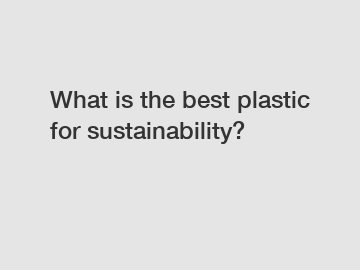What is the best plastic for sustainability?
Apr. 04, 2024
Plastic is a material that has become an integral part of our daily lives, from the packaging of our food to the construction of our homes. However, the widespread use of plastic has had detrimental effects on the environment, with plastic pollution posing a significant threat to our ecosystems. As such, there has been a growing push towards finding sustainable alternatives to traditional plastics.
One of the key factors in determining the sustainability of a plastic is its biodegradability. Traditional plastics, such as polyethylene and polypropylene, are made from non-renewable fossil fuels and can take hundreds of years to decompose. This has led to the accumulation of plastic waste in our landfills and oceans, where it can harm wildlife and leach toxic chemicals into the environment. In contrast, biodegradable plastics are designed to break down more quickly, reducing their impact on the environment.
There are several types of biodegradable plastics available on the market, each with its own unique properties and applications. One popular option is polylactic acid (PLA), which is made from renewable resources such as corn starch or sugarcane. PLA is compostable, meaning it can be broken down into organic matter by microorganisms in a controlled environment. This makes it an attractive alternative for food packaging and disposable items.

Another promising biodegradable plastic is polyhydroxyalkanoates (PHAs), which are produced by certain bacteria as a way to store energy. PHAs are fully biodegradable and can be composted at home, making them an eco-friendly option for a wide range of products. However, PHAs currently have a higher production cost compared to traditional plastics, which has limited their widespread adoption.
In addition to biodegradability, the sustainability of a plastic also depends on its recyclability. While recycling is a critical part of reducing plastic waste, not all plastics are created equal when it comes to their recyclability. For example, polyethylene terephthalate (PET) is highly recyclable and can be turned into a wide range of products, from clothing to carpeting. On the other hand, polystyrene (PS) is less commonly recycled due to its low value and limited market demand.
One innovative solution to improving the recyclability of plastics is the development of bioplastics, which are made from renewable resources and can be easily recycled. For example, polyethylene made from sugarcane ethanol has a similar chemical structure to traditional polyethylene, allowing it to be recycled using existing infrastructure. This can help reduce the reliance on fossil fuels and mitigate the environmental impact of plastic production.
When it comes to choosing the best plastic for sustainability, there is no one-size-fits-all solution. The ideal plastic will depend on factors such as the intended application, end-of-life options, and overall environmental footprint. However, by considering the biodegradability, recyclability, and renewable sourcing of a plastic, we can make more informed choices that reduce our impact on the planet.
In conclusion, the best plastic for sustainability is one that balances environmental considerations with performance and cost-effectiveness. Biodegradable plastics offer a promising alternative to traditional plastics, while recyclable bioplastics can help close the loop on plastic waste. By choosing plastics that are designed with sustainability in mind, we can help create a more environmentally conscious future for generations to come. Let's make the conscious effort to choose sustainable plastics and reduce our plastic footprint on the planet.
For more information, please visit PS plastic recycling process, pcr plastics, is abs recyclable.
157
0
0
Next: None

Comments
All Comments (0)